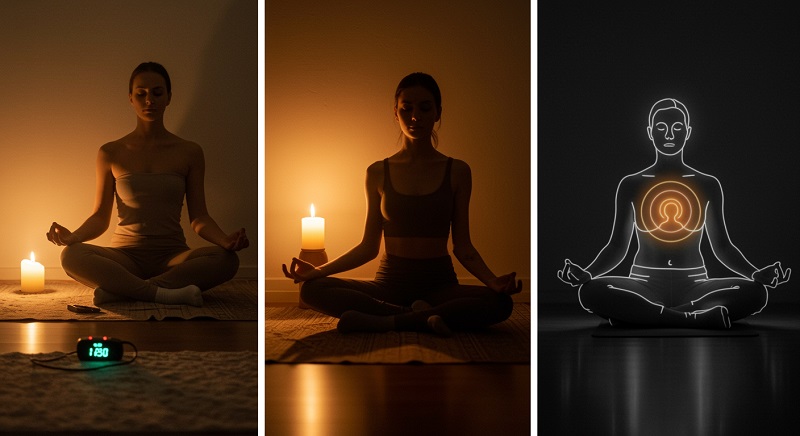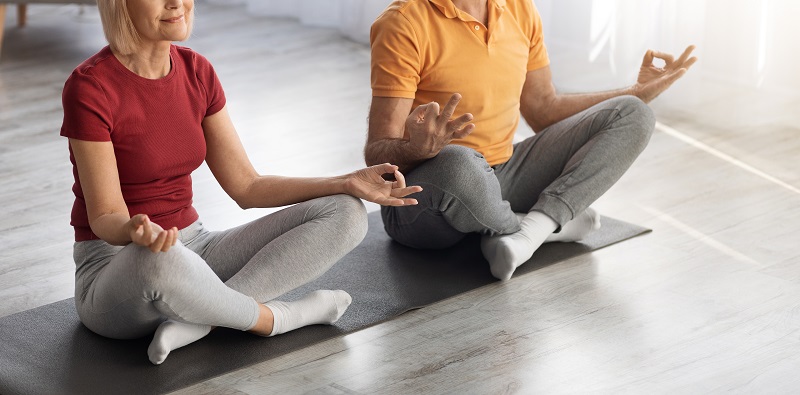Meditation is widely recognised as promoting mental clarity, emotional balance, and physical relaxation. However, many beginners wonder how long they must meditate to experience these benefits. The truth is that the time required to see results varies based on individual goals, the type of meditation practiced, and consistency.
Fortunately, you don’t need to commit hours each day to reap the rewards of meditation. Studies show that even a few minutes of mindfulness can reduce stress and improve focus. For more profound benefits, such as enhanced emotional resilience or greater self-awareness, slightly longer sessions may be needed. What’s most important, however, is consistency. Even in small increments, regular practice often delivers more noticeable results than sporadic longer sessions.
This article explores how meditation duration aligns with specific goals, why consistency matters more than session length, and tips for tailoring your practice to fit your lifestyle. Whether you’re seeking stress relief, improved concentration, or spiritual growth, understanding how to structure your meditation practice can help you see meaningful results and cultivate a lasting habit.
Initial Benefits: Minutes Can Matter

One of the most encouraging aspects of meditation is that it doesn’t require hours of practice to deliver noticeable benefits. Studies and personal experiences reveal that even a few minutes of meditation can improve mental and emotional well-being. For beginners, this is excellent news, as it lowers the barrier to entry and allows individuals to ease into the practice without feeling overwhelmed. Meditating for 5–10 minutes can help reduce stress by calming the mind and lowering the body’s production of cortisol, a hormone linked to stress. This short investment of time can result in a greater sense of calm and clarity, even on your busiest days.
Moreover, brief meditation sessions can significantly improve focus and productivity. In today’s fast-paced world, where distractions abound, dedicating just a few moments to mindfulness can help sharpen concentration and enhance cognitive performance. Techniques like focusing on your breath or practising body scans encourage the mind to stay present, improving your ability to tackle tasks more efficiently. Even professionals with demanding schedules often find that these micro-meditation practices increase their ability to manage work-related pressures and make better decisions.
In addition to stress relief and focus, short meditations can create a ripple effect of positivity throughout your day. A few minutes of mindfulness can improve mood, boost self-awareness, and encourage better emotional regulation. For example, engaging in loving-kindness meditation for 5–10 minutes can help cultivate feelings of compassion and reduce anger or frustration. Over time, these small, consistent practices build resilience, helping you respond to challenges more easily. While more profound and sustained benefits may come from longer sessions, the initial advantages of even short meditations can set the stage for a healthier, more mindful approach to life.
Consistency Over Duration

Regarding meditation, consistency matters far more than the length of individual sessions. Engaging in regular, short practices is more effective than meditating for long hours sporadically. Meditation works by rewiring your brain over time, a process called neuroplasticity, which requires steady and repeated engagement to be successful. Even just five minutes a day can yield tangible benefits when practised consistently, as it allows your mind to adapt gradually to new patterns of mindfulness and awareness. This daily routine helps meditation become a habit, seamlessly integrating into your lifestyle rather than feeling like a chore or one-off activity.
The benefits of consistency stem from how meditation creates cumulative effects. Meditation trains your mind to stay present, manage stress, and respond calmly to challenges. On the other hand, a sporadic approach may fail to establish these mental habits, much like inconsistent exercise routines that struggle to build physical strength or endurance. For example, mindfulness meditation practised daily for eight weeks has increased grey matter in brain areas associated with memory, learning, and emotional regulation. These gradual changes highlight the importance of showing up daily, even for brief sessions, to reap the long-term rewards.
Consistency cultivates discipline and builds momentum, making it easier to stick to your practice over time. Meditating daily becomes an expected part of your routine, like brushing your teeth or drinking your morning coffee. This regularity removes decision fatigue—no longer will you wonder if or when you’ll meditate; it becomes automatic. Over time, this steadfast commitment enhances your meditation skills and fosters greater self-trust and resilience. By choosing consistency over occasional lengthy sessions, you align your practice with the natural rhythms of your life, ensuring lasting results without overwhelming yourself.
Longer Sessions for Deeper Benefits

While short meditation sessions can provide immediate relief from stress and improve focus, longer sessions are often needed to experience more profound and transformative benefits. Meditating for 20–30 minutes daily allows you to move beyond surface-level relaxation and cultivate profound changes in your mental, emotional, and even physical well-being. This extended duration enables you to fully immerse yourself in the practice, fostering a deeper connection with your inner self and promoting greater mindfulness throughout the day.
One key advantage of longer meditation sessions is their ability to strengthen emotional resilience and enhance self-awareness. Meditating for an extended period allows your mind to settle more deeply, creating a space to observe your thoughts and emotions without judgment. Over time, this practice helps you recognise and address habitual thought patterns, reducing reactivity and promoting a sense of emotional balance. Techniques like mindfulness or loving-kindness meditation practised for 30 minutes daily can increase compassion, empathy, and a more positive outlook. These emotional benefits can significantly impact relationships, decision-making, and mental health.
Additionally, longer meditation sessions can deepen your spiritual practice, offering a sense of connection to something greater than yourself. Many traditional meditation techniques, such as transcendental meditation or Vipassana, recommend practising for at least 20–30 minutes twice daily to access these more profound states of awareness. During extended sessions, your mind can quieten more thoroughly, potentially leading to moments of insight, clarity, and a profound sense of inner peace. For those pursuing spiritual growth or personal transformation, longer durations can serve as a gateway to heightened consciousness and a more profound understanding of life’s interconnectedness. Dedicating more time to your meditation practice opens the door to a richer and more rewarding experience that extends beyond relaxation to create lasting, transformative changes.
Tailoring to Your Goals

Meditation is not a one-size-fits-all practice; the time and techniques needed depend primarily on your specific goals. For example, if your primary objective is stress reduction, short yet consistent mindfulness meditation sessions can yield quick results. Studies suggest meditating for as little as 5–10 minutes daily can lower cortisol levels and help you feel calmer. Mindfulness involves focusing on the present moment, often by observing your breath or bodily sensations, which can interrupt stress cycles and overthinking. With regular practice, you may notice reduced anxiety and a more remarkable ability to handle daily challenges within a few weeks.
For those aiming to improve focus and concentration, slightly longer sessions may be more effective. Meditation techniques like focused attention (where you concentrate on a single point, such as the breath, a candle flame, or a mantra) train the brain to maintain attention over time. Practising 10–20 minutes daily can enhance cognitive performance and help you stay present during tasks. Over weeks or months, this practice can improve productivity and reduce mental fatigue, making it especially beneficial for students and professionals who struggle with distractions.
A more profound commitment to meditation is often needed if your goal is emotional resilience or spiritual growth. Practices like loving-kindness meditation (which fosters compassion and empathy) or transcendental meditation (which promotes profound relaxation and self-awareness) typically require 20–30 minutes daily to create transformative changes. These practices can help you develop a more substantial inner peace, cultivate positive relationships, and connect with a more profound sense of purpose. For spiritual seekers, combining meditation with retreats or advanced techniques may lead to profound insights over time. Regardless of your specific goals, tailoring your meditation routine to suit your aspirations and lifestyle ensures you get the most out of your practice.
Listening to Your Body and Mind

Meditation is deeply personal, and understanding what your body and mind need during practice is essential for long-term success. While many guides suggest specific durations or techniques, actual progress comes from paying attention to your experience. Your physical and mental state will naturally influence how long you can meditate and the best techniques. If your body feels restless or tense, a shorter session with gentle breathing exercises may be more effective than forcing yourself to sit for extended periods. Similarly, guided meditations or techniques that encourage focus can be beneficial if your mind feels scattered.
It’s also important to recognise that meditation is not about perfection or achieving a specific result immediately. There may be days when sitting for even five minutes feels challenging, and that’s okay. Rather than judging yourself for struggling, practice self-compassion and adapt your meditation to meet your current needs. For example, if anxiety makes sitting still tricky, consider practising walking meditation or body scan techniques to connect with your physical sensations. Over time, listening to these cues helps create a meditation practice that feels sustainable and supportive rather than rigid and overwhelming.
As you continue meditating, you’ll likely become more aware of your inner rhythms and needs. Some days may call for longer, introspective sessions, while others require shorter, energising practices. This adaptability prevents burnout and allows you to build a stronger connection with yourself. By tuning in to your body and mind, you learn to honour what you need at the moment, creating a practice that evolves alongside your personal growth. Meditation, at its core, is a journey of self-discovery, and listening to your inner guidance ensures that this journey remains meaningful and rewarding.
Building a Sustainable Practice

Creating a sustainable meditation practice is essential for reaping its long-term benefits. While sitting quietly each day might seem daunting initially, starting minor is the key to developing consistency. Begin with short sessions, such as 5–10 minutes daily, which are manageable and easy to integrate into your routine. Over time, as you become more comfortable with meditation, you can gradually extend these sessions. The important thing is to prioritise regularity over duration. Even a brief practice, done consistently, can significantly improve mental clarity and emotional balance. Additionally, setting realistic goals and tracking your progress can provide motivation, reinforcing your commitment to the practice.
Establishing a routine can transform meditation into a natural part of your daily life. Try meditating at the same time each day, whether in the morning to set a positive tone or in the evening to unwind. Choose a quiet, comfortable space where you can sit without distractions. This dedicated space becomes a mental cue, signalling to your mind that it’s time to relax and focus. Pairing meditation with an existing habit, such as brushing your teeth or having your morning coffee, can also help anchor the practice in your daily schedule.
Patience and self-compassion are crucial for sustaining your meditation practice. Facing challenges like restlessness or skipping sessions is normal, but these shouldn’t discourage you. Instead, view them as opportunities to grow. Remember, meditation isn’t about achieving perfection but about showing up consistently. Celebrate small victories, such as completing a week of practice or slightly improving focus. On difficult days, remind yourself of the benefits you’ve experienced and approach the practice with curiosity rather than pressure. Building your practice gradually and prioritising consistency will create a sustainable habit that nurtures your well-being over time.
Conclusion
Meditation is a journey that offers benefits ranging from stress relief to deeper self-awareness. While the time it takes to see results varies, consistency is key. Even short sessions of 5–10 minutes a day can bring noticeable improvements in focus, relaxation, and emotional well-being. For more profound benefits, such as enhanced self-awareness or spiritual growth, 20–30 minutes daily is often recommended. The most crucial factor is making meditation a sustainable part of your routine. Starting small, creating a calming space, and meditating at the same time each day can help you build a habit that lasts. Remember, the goal is not perfection but regularity. Focus on enjoying the practice itself rather than expecting immediate results. With patience and dedication, meditation can transform your mental and emotional health, helping you navigate life with greater clarity and peace. Whether you begin with a few minutes or longer sessions, the key is to take that first step and trust the process. Over time, the benefits will unfold, enriching your life meaningfully.



